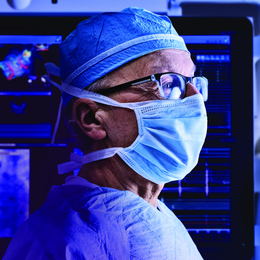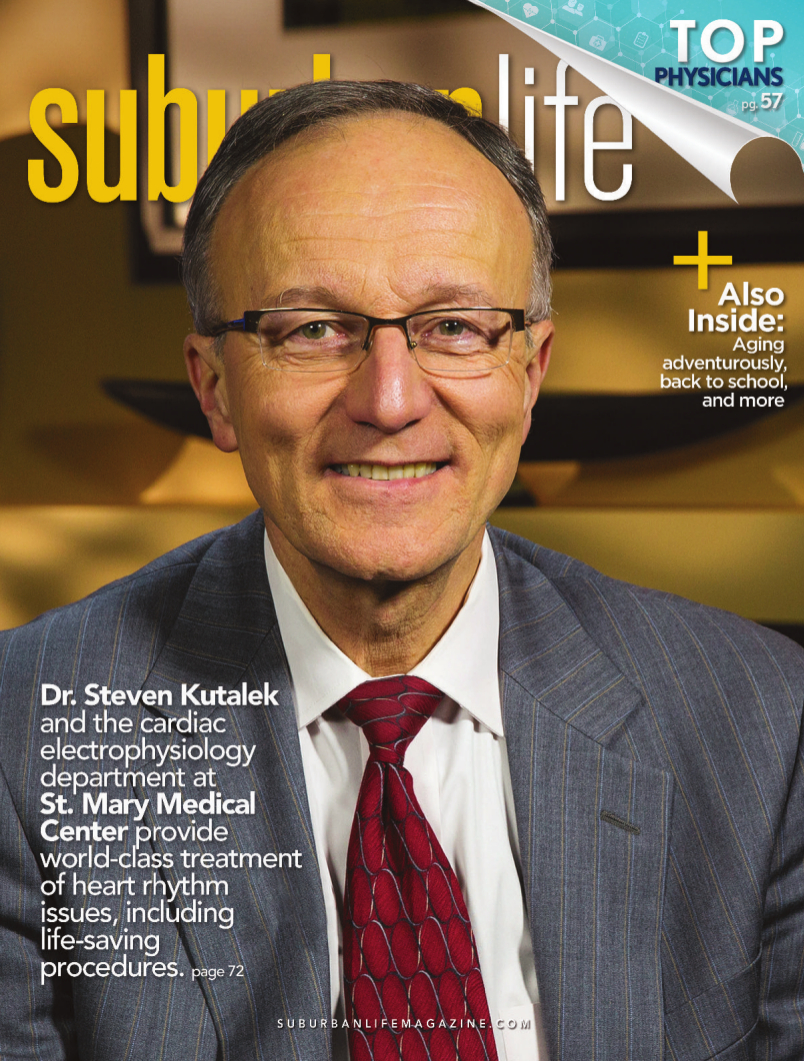
The Heart of the Matter
Dr. Steven Kutalek and the cardiac electrophysiology department at St. Mary Medical Center provide world-class treatment of heart rhythm issues, including life-saving procedures.
Some day, when her son is old enough, Marlene Gilchrist will have one heck of a story to share with him about everything she went through to bring him into the world. When that time comes, Steven P. Kutalek, M.D., and the rest of the cardiac electrophysiology team at St. Mary Medical Center will surely play a major role in the tale.
Gilchrist, a Feasterville resident, had no prior heart issues when she learned that she and her husband were expecting their second child. Despite being in her early 40s, she had a typical pregnancy without any problems—but that changed when she went into labor on Feb. 20, 2020, and proceeded to an area hospital.
With her heart rate dropping, she felt distressed and was experiencing sharp pain, even after an epidural was administered. She was advised to have the baby naturally, and an intense, nearly two-hour delivery followed. While the baby was perfectly fine, Gilchrist never felt right, and began suffering from migraine headaches a few hours after giving birth.
She was eventually released, but persistent symptoms forced her to return to the same hospital within a week. Still unable to get any answers, she went home again, only to suffer a heart attack six days later while breastfeeding her son. This time she was rushed to St. Mary and asked to meet with cardiologist Ronald Fields, M.D., who just so happened to be her boss.
“It was a crazy time,” Gilchrist recalls. “Thank God for Dr. Fields, and thank God for Dr. Kutalek and everything he did for me down the line.”
Dr. Kutalek and his colleagues in the electrophysiology department—Ashwani Gupta, M.D., Karim Nathan, M.D., and Christine Saari, CRNP—treat heart arrhythmias, such as slow or rapid heartbeats. As Dr. Kutalek explains, Gilchrist suffered a spontaneous coronary artery dissection, most likely stemming from the stress of her delivery. But even after Dr. Fields’ life-saving care, she wasn’t out of the woods yet.
“She sustained some substantial heart damage and the overall pump function of her heart was reduced,” Dr. Kutalek says. “She has a scar on her heart muscle, and because she didn’t have full recovery of her heart pump function, she was at risk of having cardiac arrhythmia and sudden death. So we implanted a defibrillator in her for protection.”
That procedure took place in November 2020, when Dr. Kutalek implanted a special device known as a subcutaneous defibrillator, or S-ICD.
“Instead of having wires go inside the heart, it’s implanted underneath the skin of the chest cavity,” he says. “This is better for someone at a young age like her who is running after two kids. People of her age who have lead wires that go into the veins, if they’re active they can break the wires over time, they may need to be extracted and replaced. Marlene’s defibrillator is more durable for someone her age, and still gives her the protection she needs.”
Gilchrist still faces some challenges today, but is grateful for the intervention from Dr. Kutalek and everyone else at St. Mary.
“He basically told me the defibrillator would be there for me if I needed it, and that it was the best thing for me and my family,” she says. “Dr. Kutalek is amazing. He’s a caring doctor and he wants the best for his patients.”
Dr. Kutalek has been providing that kind of care for more than three decades, including a long stint as the director of the electrophysiology department at Hahnemann University Hospital, where he also ran a fellowship program. He remains a clinician and educator—he is an emeritus professor of medicine at Drexel University—and helped start a medical residency program and a cardiology fellowship at Trinity Health Mid-Atlantic, the system that includes St. Mary, which he joined three years ago.
Along with implanting devices like defibrillators and pacemakers, Dr. Kutalek is one of the leading device extractors in the United States and was at the forefront of developing the technique. His department also offers ablation for heart arrhythmias and the WATCHMAN procedure, a device implanted into the left atrial appendage to prevent blood clots from forming.
“I think we’re at a top academic level in providing excellent care,” he says. “We’re a team and we work together. The other doctors are a really important part of what we’re establishing here, and I couldn’t do it without them.”
St. Mary Medical Center
Regional Electrophysiology Associates
1205 Langhorne Newtown Road, Suite 400
Langhorne, PA 19047
(215) 757-7212
trinityhealthma.org/cardiology
Regional Electrophysiology Associates
1205 Langhorne Newtown Road, Suite 400
Langhorne, PA 19047
(215) 757-7212
trinityhealthma.org/cardiology
Photo courtesy of St. Mary Medical Center
Published (and copyrighted) in Suburban Life, August 2023.



